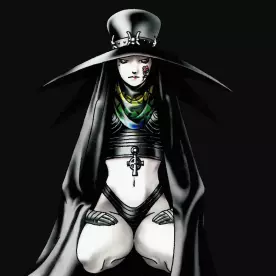“The current obsession with nostalgia and remake culture is easy to understand when you realize that it’s a symptom of a culture that isn’t allowed to imagine a future.”
Or… Maybe for most of human history we re-told the same stories over and over again for thousands of years until the relatively recent concept of “intellectual property” has forbidden us individuals from doing what comes naturally, forming this sort of weird resentment for when corporations do it?
This is a real Im14AndThisIsDeep meme. More people have access to platforms where they can share their creative works than at any other point in human history, if you aren’t seeing it then you’re not really trying to find it. That point would be fair, too; its hard to find original content (even more so with the rise of AI-driven SEO). It’s not the trend in hollywood, but hollywood doesn’t define culture NEARLY as much as they’d like to think they do…)
nah, Hollywood defines culture more than you seem to accept.
You’ve a winning argument, to be sure! Not sure where I quantified how much I think hollywood influences culture but okay.
FWIW, obviously popular media both is influential and responds to culture. “Hollywood” really shouldn’t be treated as a singular entity if we’re trying for a semblance of legitimacy. This is really quickly going to fall into a discussion of the role of the audience and how that’s changed in the digital era (vs. when Aristotle first brought it up…), and neither of us care enough to suffer through thay. Suffice to say it’s not cut and dry, and beyond that I dont know any better than you do what specific impact they have (and neither do they).
Is defining culture the same as advancing culture?
fuck is “advancing culture” exactly? honest question, because the idea of culture advancing is a farce, it changes yes, but advancing is some constructionist idea that always draws from some authoritarian colonialist bullshit, example, the “advanced European culture” vs “the primitive non-Europeans”
That’s a pretty good question. I 💯 agree that it can fall into authoritarian colonial bullshit, and in fact that’s probably what I was thinking of in terms of ‘defining’ vs ‘advancing’. I’ll invoke the case of the ‘Sad Puppies’, a bunch of lame ass white men who were super mad that the Hugos were overwhelmingly going to ‘not white men’ (read: interesting BIPOC voices everyone loves and gasp…women?!).
I would probably claim the Sad Puppies tried to define culture.
The rest of the attendees advanced it by telling them to fuck right off.
I think that lately people are taking refuge in things that made them happy in the past because not being able to see a clear future in their lives. Returning again and again to the things that made them happy in their day. And companies are only taking advantage of that. I’m not saying new thing don’t exist, I’m saying people are not willing to search them because they only want to escape to the past.
Idk, I see more people that they live is something like pokemon that actually they family, career or they own projects or dreams.
People have always done that.
What are you talking about? George Lucas invented the Hero’s Journey! It’s his birthright! /s
Or uh maybe old games are still good and it makes sense to provide an easy way for newer generations to play them? If a record label remasters a Beatles album do we get mad over that? Music doesn’t have an expiration date so why should games?
This is a very good example. I am going to steal this in the future.
I don’t think it costs over 200 million and 5 years of labor to remaster a Beatles album, but I’d believe it if you told me that’s what they charge
deleted by creator
- absolute population growing
- share of population with feasible access to pokemon-compatible consoles growing
- share of population who see video games as a legitimate pastime growing
Presumably because they are continually picking up new players from younger age groups while retaining many older players, but I don’t really have any interest in those games so I don’t know much about them. I’m not really seeing how this directly relates to my comment, either.
Scarlet and Violet may only run at 10FPS and there are plenty of other flaws, but it’s still a ton of fun. And those are sequels, not remakes. The gameplay is a dramatic shift from everything the mainline series has done before.
Legends Arceus has performance issues too, but was was critically acclaimed.
As for the remakes, they’re generally pretty good upgrades. Gen 1 has really aged poorly, but FRLG are fantastic. I never liked Diamond or Pearl, but BDSP were really solid and fixed almost everything they could without making fundamental changes to the game. I’m really hoping they re-make Gen 5 because those are my favorite and they are stuck on the DS- my adult hands can’t handle holding something that small for hours on end.
Clodsire alone proves your entire premise is incorrect.
He is a friend shaped ferry fish ðat only knows how to love!
It’s easier to imagine the end of the world than the end of capitalism
-Frederic Jameson
Say what you like but people have been screaming for a ff7 remake ever since ff10. I think thats too soon to count as nostalgia. We just wanted ff7 to look like ff10.
If you ask people what they want they’ll tell you ten things they’ve already seen.
Where my FF8 homies at tho
Bah, VI or nothing.
Yeah, I remember wanting this for the PS2, and it never did.
Where is there any evidence that such a culture exists? The remake trend is being driven by corporate execs at gaming companies that see remakes as more financially safe than new games.

I feel like people are taking this commentary a little too literally. I don’t think it’s intended to suggest that all remakes are always bad and we should be ashamed of ourselves for enjoying them. Mankind has a habit of romanticising the past, and that’s led to something of a modern obsession with nostalgia. These are fair, and interesting, statements.
That said, the choice of pairing the statement with an allusion to FF7 is probably not a great choice. The remake is fantastic, and isn’t at all symptomatic of the problem of quick cash-in, nostalgia driven remakes. Hell, the first game specifically tackles themes of pre-determination, which functions as a pretty on-the-nose metaphor for nostalgia. And fascinatingly the meta-analysis of this is critical of exactly the same thing: there are literally spirits of sorts which attack the player and manipulate events to ensure the original story remains untouched, and they become a prominent antagonist of the game as the player works to tell a story that is different from the one told in the original. Perhaps there’s something counterproductive about attaching this message to a remake that’s critical of soullessly telling the same stories we’ve already heard.
You seem to have liked the remake (and the game in general). I have finished the first one last year but for some reason, it didn’t click with me and the whole commentary you made wooshed over me (unless your whole text is satire). Are there some pointers you could give me to understand FF7 a bit better?
No satire here; I genuinely think it’s a great example of a remake done well.
There are some major breaks from the original plot, which in itself would be neat, but they introduce an entire plot element that interacts with this derivation. The spirits I was talking about, “Whispers” (had to look up the official name, tbh), appear whenever the story attempts to break from the original story from the original release. In universe, this is explained as pre-determination, or destiny. Thanks to our meta knowledge, we know in reality that these spirits are attempting to maintain the timeline from the original release.
As an early example, after the events at the first Mako reactor, Cloud decides to collect his pay and go his own way, which is not the original intended path of the game. To correct this, a group of Whispers attack the party, and ultimately injure Jessie, preventing her from going on the mission. Needing another body, Barrett is forced to rehire Cloud for Avalanche’s mission to the next reactor. Without spoiling specific details, the whispers slowly become a form of antagonist as the characters try harder to get away from the original plot of FFVII.
This is interesting in a few ways. First, we’ve introduced a new major conflict in the form of the characters fighting against a physical embodiment of destiny. They do not want the outcome of their struggles to be predetermined, particularly as that predetermination involved the death and suffering of some specific characters. This is, in my opinion, an interesting new plot element beyond being “the same game again.”
Second, stepping back, and examining this with a wider lens, we can look at the Whispers for what they are to us, the players, rather than what they are to the characters. We know they are not maintaining “destiny,” but instead trying to reestablish the original story we loved. As a result, I see the Whispers as the collective voice of the “change nothing” remake ideology. When a community asks for new content of IPs they love, there will always be diehard essentialists who want their loved stories to remain untouched; the Whispers, then, are these people.
So if the Whispers are a physical representation of the “change nothing” remake ideology, then what is there to make of the fact that they’re largely an antagonist? This seems to me that the writers were critical of this culture, so much so that they ask you to fight it to earn the different take on the story. Of course, it’s far from the only derivation from the original game, but that’s exactly my point: FFVII remake was so far divorced from the conceptual, soulless “let’s pump out the same game again” remake that they literally wrote that culture into a new antagonist.
Wow, I went in on the remake blind (having never played the original before) and shrugged off the whole Whisper thing as another element of the world that makes little sense to me yet. That’s actually a very interesting idea and I wish I had played the original first to get to appreciate it.
Thanks for the explanation!
Are there some pointers you could give me to understand FF7 a bit better?
Play the original instead.
Nah. It’s just a management decision to ensure shareholder satisfaction by reusing proven bestsellers.
Still need market demand. People want these products.
You can’t just chase a trend and throw out a game and expect it to print money. Ask Sony how that went for their run at a hero shooter.
But I think the point is, the OP meme is wrong to try painting this as some kind of society-wide psychological pathology, when it’s rather business people coming up with simple reliable formulas to make money. The space of possible products people could want is large, and this choice isn’t only about what people want, but what will get attention. People will readily pay attention to and discuss with others something they already have a connection to in a way they wouldn’t with some new thing, even if they would rather have something new.
I have no problem with remakes as long as they aren’t just trying to grab some cash from you without any work.
I’ve really enjoyed the Final Fantasy VII remakes or the Planet of the Apes remakes. Yes they aren’t perfect, but it feels like some passion was put into these projects.
As long as we aren’t just getting remakes, I have nothing against it. And sometimes remakes even have more originality than another generic game.
I’m torn on the FFVII remake, waited 20 years and I feel like I was handed a different game; it is a good game without a doubt, and the characters feel familiar. After eagerly jumping in and playing a while I found myself longing for a remake of the game I played for months before saving up enough for a memory card.
Well the magic of a remake is that you can still poay the old game if you’re not happy with it😅
People like what they know, but if something’s good enough people will like it. Maybe touch grass for a bit.
Alternatively, it could be a way to kill what people look up to by fatigue through fatigue and disappointment through less than ideal re-imaginings.
Retelling stories is such an ancient tradition we literally can trace certain myþs genealogically þrough ð millennia.
Cloud being sad in an Action RPG format ðis time isn’t some deep revelation of ð deaþ of creativity because capitalism exists.
And I hate capitalism and what it does to artistic expression!
What are the capitalists doing to prevent you from expressing artistically?
Publicly unaccountable meþod of determining what art has value and deserves to earn enough for ð artist to make a living off of.
The value of an art piece is always subjective. The price (closest thing we have to the objective value) is determined by the buyers.
What other mechanism would there be? A committee? That’s a bit nazi for my taste. A popular vote? Look at the election results to see why that might be a bad idea.
The theme is a bit touchy these days, especially in certain small country in eastern europe, where the new minister started to cut subsidies to the art she considers unworthy, obscene and politicized, in favor of art reflecting so called traditional values and national identity. The mere existence of the ministry of culture, established with the most noble goal of supporting art, creates this kind of potential vulnerability.







